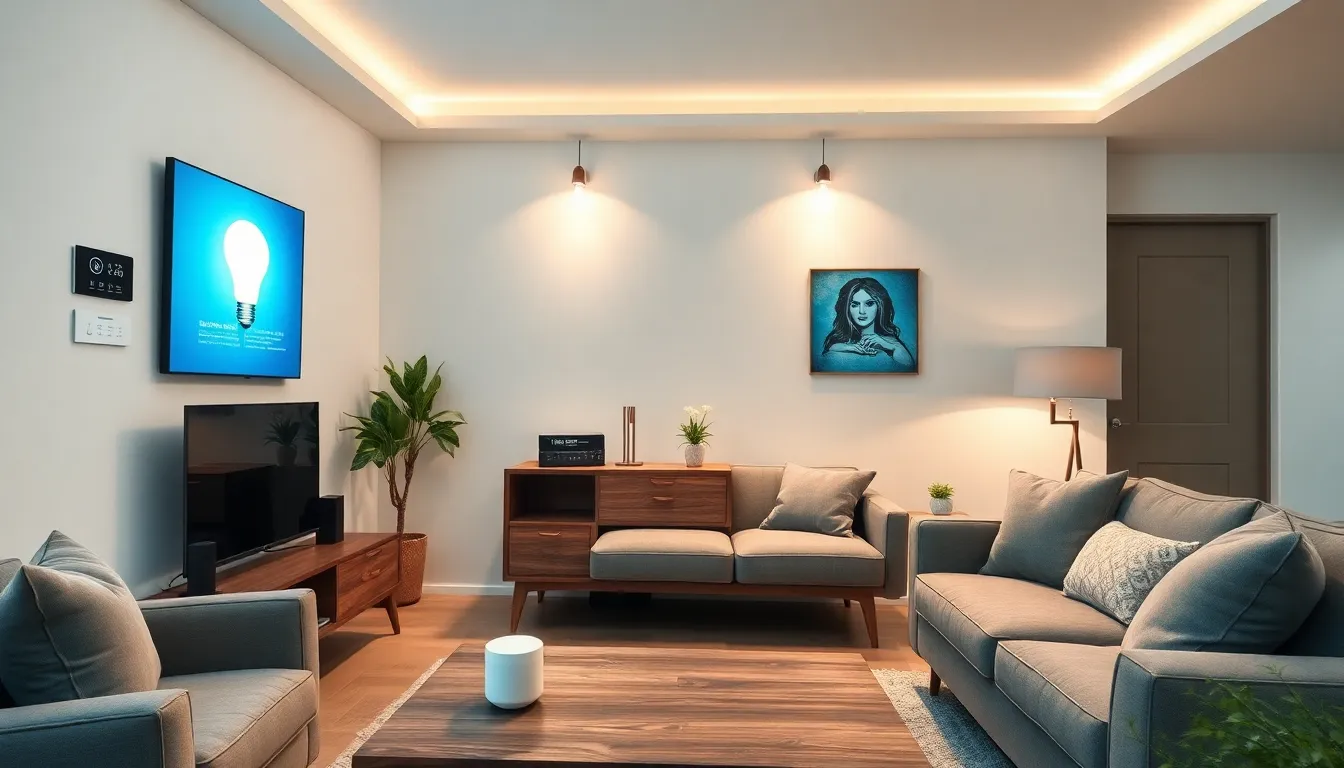Imagine waking up to your coffee brewing itself while your curtains gently part to reveal the morning sun. Customized smart homes aren’t just a trend; they’re the future of living. With technology that anticipates needs and preferences, these homes transform mundane routines into seamless experiences.
From mood lighting that adjusts with your favorite Netflix binge to security systems that could outsmart a cat burglar, the possibilities are endless. Why settle for a home that merely shelters you when you can have a high-tech haven that caters to your every whim? Dive into the world of customized smart homes and discover how they can make life not just easier but a whole lot more fun. After all, who wouldn’t want a home that’s smarter than their in-laws?
Table of Contents
ToggleOverview of Customized Smart Homes
Customized smart homes utilize advanced technology to enhance the living experience. These homes integrate devices like smart thermostats, lighting systems, and security cameras tailored to individual preferences. Automation simplifies daily routines by controlling appliances, which can brew coffee or adjust settings based on user habits.
Residents enjoy increased energy efficiency through smart home technology. Smart thermostats optimize heating and cooling, potentially reducing energy bills by up to 20%. Personalized environments improve comfort, enabling users to adjust lighting colors or temperature remotely via smartphone apps.
Security features play a crucial role in fostering peace of mind. Homeowners can monitor their property in real time, receiving alerts for any unusual activity. Smart locks allow remote access management, ensuring convenience while enhancing security.
Installation choices vary based on budget and preferences. Some homeowners opt for complete automated systems, while others select specific devices to integrate within their existing setup. Many users appreciate scalability, adding new devices as their needs evolve over time.
Companies specializing in smart technology provide personalized consultations, helping clients design their ideal home setup. Customization options often include device compatibility, allowing diverse brands to work seamlessly together. This flexibility supports the unique demands of each household.
Customized smart homes bridge technology and daily living. They create environments that adapt and respond, ultimately transforming the ordinary into an extraordinary experience.
Benefits of Customized Smart Homes

Customized smart homes offer numerous advantages that significantly enhance daily living. They improve comfort, convenience, and energy savings, making them an attractive option for homeowners.
Enhanced Convenience
Enhanced convenience stands out as a primary benefit of smart homes. Automating daily tasks like adjusting temperature or scheduling lights makes life simpler. Homeowners can control devices remotely, providing comfort without physical effort. Smart assistants, like Google Home or Amazon Alexa, streamline home management through voice commands. Scheduling routines ensures consistency, enabling efficient task handling. With personalized settings, residents enjoy environments tailored to their specific needs, ensuring high comfort levels.
Increased Energy Efficiency
Increased energy efficiency is another significant advantage. Smart thermostats can reduce energy consumption, saving homeowners up to 20% on energy bills. Automated systems optimize usage by learning preferences and adjusting settings accordingly. This reduces waste and contributes to a more sustainable lifestyle, positively impacting both the environment and the wallet. Integrating energy-efficient lighting further enhances savings, as smart bulbs use less power than traditional options. Moreover, monitoring usage through smartphone apps lets users spot potential savings opportunities, empowering them to make informed choices.
Components of Customized Smart Homes
Customized smart homes incorporate various components that enhance convenience and comfort. These components include smart devices, appliances, and home security systems tailored to individual preferences.
Smart Devices and Appliances
Smart devices and appliances form the backbone of customized smart homes. Thermostats manage temperatures efficiently, allowing users to reduce energy consumption by up to 20%. Lighting systems offer automation and remote control features, adapting to user routines. Refrigerators communicate with homeowners, providing inventory alerts and recipe suggestions. Smart speakers serve as control hubs, enabling voice commands for multiple devices. Each device integrates seamlessly, creating an interconnected ecosystem that simplifies daily tasks and personalizes the living experience.
Home Security Systems
Home security systems play a pivotal role in enhancing safety within customized smart homes. Cameras provide real-time monitoring, allowing homeowners to keep an eye on their properties remotely. Smart locks offer keyless entry, improving convenience while ensuring security. Alarm systems integrate with mobile apps, sending alerts during breaches. Motion sensors detect any unusual activity, alerting homeowners instantly. Each feature contributes to a fortified home that adapts to the routines and lifestyles of its occupants, bringing peace of mind and control.
Challenges in Implementing Customized Smart Homes
Customized smart homes bring various challenges that can hinder their effective implementation. Cost considerations represent a significant barrier for many homeowners. Smart home devices range from inexpensive gadgets to high-end systems, often leading to unexpected expenses during installation. Average costs can climb to over $20,000, depending on the complexity and extent of the system. Budget constraints influence decisions on which devices to integrate, requiring careful planning to ensure affordability.
Technical compatibility issues also pose a challenge during setup. Different brands may use incompatible protocols, complicating integration efforts. Homeowners face difficulties when attempting to connect devices designed by various manufacturers. They may need to invest in additional hubs or bridges to facilitate communication among devices, which can add to the overall expenses. Compatibility problems can lead to frustration when systems fail to function seamlessly, undermining the smart home experience.
Future Trends in Customized Smart Homes
Customization in smart homes becomes increasingly advanced due to emerging technologies. Artificial intelligence integration allows systems to learn user behaviors, enhancing automation efficiency. Voice-activated devices gain popularity, allowing homeowners to control their environments effortlessly through natural conversations.
Energy management systems evolve, enabling real-time monitoring and automatic adjustments based on occupancy and preferences. Smart appliances, like refrigerators and ovens, become more intelligent, suggesting meals based on available ingredients and automating cooking processes.
Security systems also witness significant improvements, integrating facial recognition and remote surveillance capabilities. Homeowners experience peace of mind with alerts for unusual activities and the ability to monitor their properties from anywhere.
Furthermore, seamless device compatibility becomes crucial as homeowners desire integrated systems across different brands. Companies emphasize solutions that unify various smart home devices, improving user experiences while reducing complexity.
In addition, sustainable living trends drive customization. Smart homes respond to eco-friendly demands by optimizing energy use and utilizing renewable energy sources more effectively. Homeowners benefit from energy savings and generations of reduced carbon footprints.
Lastly, personalized health features gain traction within customized smart homes. Wellness monitors track air quality, humidity levels, and sleep patterns, promoting healthier living environments. Enhanced home environments support overall well-being, making customized smart homes not just convenient but essential for modern lifestyles.
Customized smart homes represent a significant leap in how people interact with their living spaces. By seamlessly integrating technology into daily routines, they enhance convenience and comfort while promoting energy efficiency. Homeowners can enjoy personalized environments that cater to their unique preferences and needs.
As advancements continue to shape the future of smart technology, the potential for these homes to evolve is limitless. With a focus on sustainability and health, customized smart homes are not just a trend but a necessary evolution in modern living. Embracing this innovative approach allows individuals to transform their everyday experiences into something extraordinary.


